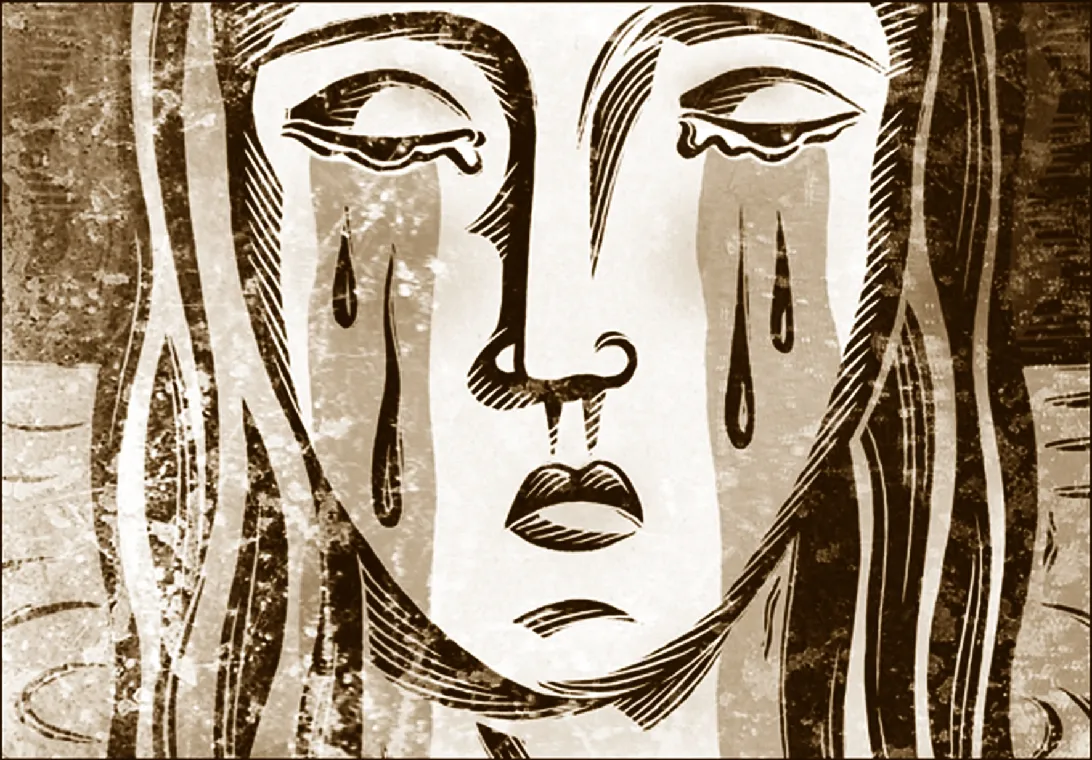痛苦也是财富
2014-12-18林巍
∷林巍 文/译
原 文
[1] 人生固然有欢乐,但也一定不乏痛苦。有了这种认识和思想准备是非常必要的,因为这样会使你的生活增加欢乐而减少痛苦。
[2] 鸟瞰人生,可略有领悟。上学时,有获得知识的乐趣,便有做功课、考试、排名次的危机与痛苦。同时,也有同学间相处的融合与纠结。青年时,春心萌动,幻想联翩,难以实现,亦难免陷入困扰。
[3] 结婚之后,实际进入了更多的矛盾之中;思想的落差、相处的困难、子女的教育、财物的争执等等,也会陷入婚姻危机。随后,年龄愈大,健康愈差,事业、家庭中的许多潜在矛盾会日益突出,因而又会有中年危机和老年危机,直至步入死亡。
[4] 所以说,人生在世,如意的事不足一二,不如意的则十有八九。但这“八九”不是负担,而是有用的,因为人在痛苦中所学到的,要比在欢乐中所学到的多得多。
[5]“自古欢愉酿糟糠,从来痛苦出杰作”。对此,司马迁早在两千多年前便有精彩论述:“盖西伯拘而演《周易》;仲尼厄而作《春秋》;屈原放逐,乃赋《离、骚》;左丘失明,厥有《国语》;孙子膑脚,《兵法》修列;不韦迁蜀,世传《吕览》;韩非囚秦,《说难》、《孤愤》;《诗》三百篇,大氐贤圣发愤之所为作也。此人皆意有所郁结,不得通其道,故述往事,思来者”。
[6] 所以,让我们把人生每一阶段上的痛苦,都当做自己的宝贵财富吧。
译 文
[1] There's no rose without a thorn. This thought is absolutely necessary to prepare you to experience less pain and more joy in your journey of life.
[2] With a bird’s-eye view, you may realize something meaningful. During your school years, while joyfully acquiring knowledge you are also under the pressure of homework, examinations, and ranking. You face crises and agony. Meanwhile, all sorts of intricate affairs may happen between you and your classmates. In your youth, puberty may fill you with unrealized desires and send you into deeper perplexity.
[3] Entering marriage, you are actually in the center of all the contradictions—the matching of different personalities, enduring of family members, children’s schooling, financial management and so on, you may also fall into marriage crisis. As you age, your health may deteriorate and various troubles in your career and family may gradually emerge. Mid-life and old-age crises will
[4] We may therefore conclude that much of our life may not be spent in contentment. However, the things that discontent are, in fact, not useless since you may learn more from them than from the things that cheered you up.
[5] As the saying goes, “It seems to be a perpetual rule that flops are produced elatedly and masterpieces painstakingly”. To put it vividly, the great historian Sima Qian had a view even two thousand years ago:“When Emperor Wen of Zhou Dynasty was arrested,he produced the classic Zhou Yi Jing; Confucius wrote the History of Spring and Autumn while he was experiencing adversity; Qu Quan produced his monumental long poem, On Encountering Sorrow,during his exile. When Zuo Qiu lost his sight and Sun Zi had his feet chopped off, they edited their writings and stratagems. After Lü Buwei was forced to live in Shu, the valuable The Book of Lü was fortunately handed down to posterity. Similarly, when Han Feizi was imprisoned in Qin,On Diff i culty and On Resentment—two precious books—were written by him. Three hundred Classic Poems were also produced in roughly the same way, where the writers’ hearts were smouldering in the doldrums with no way out: they therefore conveyed everything in words, narrating the past and contemplating the future”.
[6] Let’s treat all the sufferings at every stage of life as assets which can only do us good.
译 注
在[1]中,“人生固然有欢乐,但也一定不乏痛苦”,未按其字面意思译成 While life has happiness,it certainly has painfulness, 而引用了英文的谚语T h e r e's no rose without a thorn,更为简练而生动。“这种认识和思想准备是非常必要的……”,其中的“认识”似可为cognition,意为the mental process or faculty of knowing, including aspects such as awareness, perception, reasoning,and judgment(思想过程或认识才能,包括意识、知觉、推理和判断等),而“思想”为 thought, 其意为the act or process of thinking or cogitation(思考的行为或过程,亦或思索),在此,二者的英文意思不免有重复之处,故可将其合并thought;同时,将“准备”译为动词prepare,整句为This thought is absolutely necessary to prepare you to... 因这里是讲人生,故将“生活”扩展为your journey of life;类似的英文表述有很多,如:On your journey of life, everything may turn old, only years remaining fresh.(你的生命旅途上,一切都变得陈旧,只有岁月常新);Please follow these rules to make the journey of your life a journey of joy.(那就请你遵循这些原则,让你的生活旅途充满欢乐吧);As you continue your journey on this stage of life, we hope that you too will try new steps and find the strength and courage to carry on the dance of life! (当您在生命舞台奋斗的时候,我们希望您找寻生命之舞的勇气和力量,走好人生的每一步!)等。同时,有许多诗歌和文章都以此为主题,如:The journey of life is like a bus trip / We all know that a bus trip has its origin and its final destination. But what we cannot predict are the experiences along the way / Some people have longer journeys, while others have shorter ones / Some people are very relaxed and they can enjoy the scenery as it rolls by / Some are always crowded and must push and struggle for room,always feeling disconcerted...(人生,就像坐一辆公交车 / 我们知道它有起点和终点,却无法预知沿途的经历 /有的人行程长,有的人行程短 / 有的人很从容,可以欣赏窗外的景色 / 有的人很窘迫,总处于推搡和拥挤之中……)等。
在[2]中,“鸟瞰人生,可略有领悟”,这里只取其“鸟瞰”之意:bird’seye view;“略有领悟”,something meaningful。将“……排名次的危机与痛苦”分为两句处理:...and ranking. You face crises and agony,以示清晰。可见,在中译英里,并不总是将短句合并为长句,有时亦可相反。“……春心萌动,幻想联翩,难以实现,亦难免陷入困扰”,未作一一对译,而是概括、综述为:puberty may fill you with unrealized desires and send you into deeper perplexity.在翻译中,这是化繁为简的方法,类似的如:“人无论多么复杂,都是一个有限系统,而认识的对象——世界,却是一个无限系统,这就要求人在信息处理方面要具有以简驭繁、以有限形式去容纳无限内容的能力”不妨译为:No matter how complicated a human is as a system, the human system is a limited one compared with the unlimited world that he tries to understand. In handling the overwhelming information that human beings are confronted with,highly efficient approaches have thus been developed. 等。
在[3]中,“……实际进入了更多的矛盾之中;思想的落差、相处的困难……”,其中“更多的矛盾”,未按字面意思译成m o r e contradictions,而是为in the center of all the contradictions;“思想的落差”,这里指的是夫妻间性格的磨合,故为the matching of different personalities;“相处的困难”,也主要是指家庭成员之间的,故为enduring of family members。“年龄愈大”,将age用为动词,类似的有:As we age our appetite would slough.(随着年龄的增长,我们的食欲会减弱);These buildings are aging, and some are unsafe now.(这些建筑已经老化,有些不安全了)等。
“潜在矛盾会日益突出”,因emerge 已有显露、呈现之意,故未将“潜在矛盾”译成potential contradictions,而仅为various troubles。“中年危机和老年危机”,合译为 mid-life and oldage crises,而(直至步入)“死亡”,未译成通常的death, 而为讳语eternity;类似的有:We laid him to rest for all eternity.(我们安葬了他);I want to be with you through eternity.(我愿来世与你同在)等。
在[4]中,“如意的事不足一二,不如意的则十有八九”,未按其字面意思译为 in one’s life less than 10-20% of what one experiences is satisfactory, but over 80-90%isn’t,而是将其浓缩提炼,进而概述为:much of our life may not be spent in contentment. 其中的contentment本义为The state of being contented;satisfaction;如:In gerocomium,the old men spent his old age in contentment.(在敬老院老人们晚年过得很称心);She found great contentment in reading novels.(读小说使她得到极大满足)等。
在[5]中,“自古欢愉酿糟糠,从来痛苦出杰作”实为谚语,故以As the saying goes启始,而此句亦不宜死板对应;“自古”、“从来”本为一意,故以perpetual述之, “糟糠”这里泛指不成功的艺术作品,难以具体落实,故用了 flop,其意为utter failure;“欢愉”则指得意洋洋与略带轻浮,故用了副词elatedly,意指exultantly proud and joyful。这也可说是一种“互文”,如“论大功者不录小过,举大美者不疵细瑕”(《汉书·陈汤传》),可合并而译为:In evaluating one’s merits and virtue,his trivial faults and minor flaws should be neglected.

接下来司马迁的论述精彩而富有文采,用词错落有致,翻译成英文时,亦应尽力保持其原有风格,但似乎又很难完全存其韵味。不妨将其分解为....was arrested,...while he was experiencing adversity; ...during his exile等,以求变化、不重复,又多少体现原文的韵律。“左丘失明,厥有《国语》;孙子膑脚,《兵法》修列”,两句并列译为 When Zuo Qiu lost his sight and Sun Zi had his feet chopped off, they edited their writings and stratagems,都试图使译文变化错落而不显呆板。
在[6]中,“都当做自己的宝贵财富”,可用...as assets加上which can only do us good以示强调。“Can do...good”,意为“对……有好处”,如Stop smoking now can only do you good.(现在戒烟,只会对你有好处);One enemy can do more harm than ten friends do you good.(十个朋友对你做的好事,抵不上一个敌人造成的危害)等。
